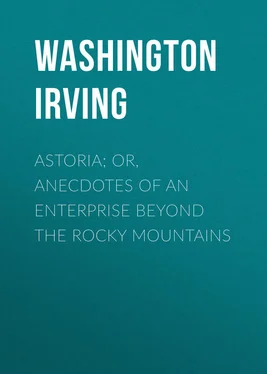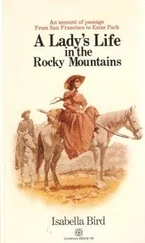Washington Irving - Astoria; Or, Anecdotes of an Enterprise Beyond the Rocky Mountains
Здесь есть возможность читать онлайн «Washington Irving - Astoria; Or, Anecdotes of an Enterprise Beyond the Rocky Mountains» — ознакомительный отрывок электронной книги совершенно бесплатно, а после прочтения отрывка купить полную версию. В некоторых случаях можно слушать аудио, скачать через торрент в формате fb2 и присутствует краткое содержание. Жанр: foreign_antique, foreign_prose, на английском языке. Описание произведения, (предисловие) а так же отзывы посетителей доступны на портале библиотеки ЛибКат.
- Название:Astoria; Or, Anecdotes of an Enterprise Beyond the Rocky Mountains
- Автор:
- Жанр:
- Год:неизвестен
- ISBN:нет данных
- Рейтинг книги:5 / 5. Голосов: 1
-
Избранное:Добавить в избранное
- Отзывы:
-
Ваша оценка:
- 100
- 1
- 2
- 3
- 4
- 5
Astoria; Or, Anecdotes of an Enterprise Beyond the Rocky Mountains: краткое содержание, описание и аннотация
Предлагаем к чтению аннотацию, описание, краткое содержание или предисловие (зависит от того, что написал сам автор книги «Astoria; Or, Anecdotes of an Enterprise Beyond the Rocky Mountains»). Если вы не нашли необходимую информацию о книге — напишите в комментариях, мы постараемся отыскать её.
Astoria; Or, Anecdotes of an Enterprise Beyond the Rocky Mountains — читать онлайн ознакомительный отрывок
Ниже представлен текст книги, разбитый по страницам. Система сохранения места последней прочитанной страницы, позволяет с удобством читать онлайн бесплатно книгу «Astoria; Or, Anecdotes of an Enterprise Beyond the Rocky Mountains», без необходимости каждый раз заново искать на чём Вы остановились. Поставьте закладку, и сможете в любой момент перейти на страницу, на которой закончили чтение.
Интервал:
Закладка:
The turbulence and rapidity of the current continually augmenting as they advanced, gave the voyagers intimation that they were approaching the great obstructions of the river, and at length they arrived at Strawberry Island, so called by Lewis and Clarke, which lies at the foot of the first rapid. As this part of the Columbia will be repeatedly mentioned in the course of this work, being the scene of some of its incidents, we shall give a general description of it in this place.
The falls or rapids of the Columbia are situated about one hundred and eighty miles above the mouth of the river. The first is a perpendicular cascade of twenty feet, after which there is a swift descent for a mile, between islands of hard black rock, to another pitch of eight feet divided by two rocks. About two and a half miles below this the river expands into a wide basin, seemingly dammed up by a perpendicular ridge of black rock. A current, however, sets diagonally to the left of this rocky barrier, where there is a chasm forty-five yards in width. Through this the whole body of the river roars along, swelling and whirling and boiling for some distance in the wildest confusion. Through this tremendous channel the intrepid explorers of the river, Lewis and Clarke, passed in their boats; the danger being, not from the rocks, but from the great surges and whirlpools.
At the distance of a mile and a half from the foot of this narrow channel is a rapid, formed by two rocky islands; and two miles beyond is a second great fall, over a ledge of rocks twenty feet high, extending nearly from shore to shore. The river is again compressed into a channel from fifty to a hundred feet wide, worn through a rough bed of hard black rock, along which it boils and roars with great fury for the distance of three miles. This is called “The Long Narrows.”
Here is the great fishing place of the Columbia. In the spring of the year, when the water is high, the salmon ascend the river in incredible numbers. As they pass through this narrow strait, the Indians, standing on the rocks, or on the end of wooden stages projecting from the banks, scoop them up with small nets distended on hoops and attached to long handles, and cast them on the shore.
They are then cured and packed in a peculiar manner. After having been opened and disemboweled, they are exposed to the sun on scaffolds erected on the river banks. When sufficiently dry, they are pounded fine between two stones, pressed into the smallest compass, and packed in baskets or bales of grass matting, about two feet long and one in diameter, lined with the cured skin of a salmon. The top is likewise covered with fish skins, secured by cords passing through holes in the edge of the basket. Packages are then made, each containing twelve of these bales, seven at bottom, five at top, pressed close to each other, with the corded side upward, wrapped in mats and corded. These are placed in dry situations, and again covered with matting. Each of these packages contains from ninety to a hundred pounds of dried fish, which in this state will keep sound for several years. 5 5 (Lewis and Clarke, vol. ii. p. 32.)
We have given this process at some length, as furnished by the first explorers, because it marks a practiced ingenuity in preparing articles of traffic for a market, seldom seen among our aboriginals. For like reason we would make especial mention of the village of Wishram, at the head of the Long Narrows, as being a solitary instance of an aboriginal trading mart, or emporium. Here the salmon caught in the neighboring rapids were “warehoused,” to await customers. Hither the tribes from the mouth of the Columbia repaired with the fish of the sea-coast, the roots, berries, and especially the wappatoo, gathered in the lower parts of the river, together with goods and trinkets obtained from the ships which casually visit the coast. Hither also the tribes from the Rocky Mountains brought down horses, bear-grass, quamash, and other commodities of the interior. The merchant fishermen at the falls acted as middlemen or factors, and passed the objects of traffic, as it were, cross-handed; trading away part of the wares received from the mountain tribes to those of the rivers and plains, and vice versa: their packages of pounded salmon entered largely into the system of barter, and being carried off in opposite directions, found their way to the savage hunting camps far in the interior, and to the casual white traders who touched upon the coast.
We have already noticed certain contrarieties of character between the Indian tribes, produced by their diet and mode of life; and nowhere are they more apparent than about the falls of the Columbia. The Indians of this great fishing mart are represented by the earliest explorers as sleeker and fatter, but less hardy and active, than the tribes of the mountains and prairies, who live by hunting, or of the upper parts of the river, where fish is scanty, and the inhabitants must eke out their subsistence by digging roots or chasing the deer. Indeed, whenever an Indian of the upper country is too lazy to hunt, yet is fond of good living, he repairs to the falls, to live in abundance without labor.
“By such worthless dogs as these,” says an honest trader in his journal, which now lies before us, “by such worthless dogs as these are these noted fishing-places peopled, which, like our great cities, may with propriety be called the headquarters of vitiated principles.”
The habits of trade and the avidity of gain have their corrupting effects even in the wilderness, as may be instanced in the members of this aboriginal emporium; for the same journalist denounces them as “saucy, impudent rascals, who will steal when they can, and pillage whenever a weak party falls in their power.”
That he does not belie them will be evidenced hereafter, when we have occasion again to touch at Wishram and navigate the rapids. In the present instance the travellers effected the laborious ascent of this part of the river, with all its various portages, without molestation, and once more launched away in smooth water above the high falls.
The two parties continued together, without material impediment, for three or four hundred miles further up the Columbia; Mr. Thompson appearing to take great interest in the success of Mr. Stuart, and pointing out places favorable, as he said, to the establishment of his contemplated trading post.
Mr. Stuart, who distrusted his sincerity, at length pretended to adopt his advice, and, taking leave of him, remained as if to establish himself, while the other proceeded on his course towards the mountains. No sooner, however, had he fairly departed than Mr. Stuart again pushed forward, under guidance of the two Indians, nor did he stop until he had arrived within about one hundred and forty miles of the Spokan River, which he considered near enough to keep the rival establishment in check. The place which he pitched upon for his trading post was a point of land about three miles in length and two in breadth, formed by the junction of the Oakinagan with the Columbia. The former is a river which has its source in a considerable lake about one hundred and fifty miles west of the point of junction. The two rivers, about the place of their confluence, are bordered by immense prairies covered with herbage, but destitute of trees. The point itself was ornamented with wild flowers of every hue, in which innumerable humming-birds were “banqueting nearly the livelong day.”
The situation of this point appeared to be well adapted for a trading post. The climate was salubrious, the soil fertile, the rivers well stocked with fish, the natives peaceable and friendly. There were easy communications with the interior by the upper waters of the Columbia and the lateral stream of the Oakinagan, while the downward current of the Columbia furnished a highway to Astoria.
Читать дальшеИнтервал:
Закладка:
Похожие книги на «Astoria; Or, Anecdotes of an Enterprise Beyond the Rocky Mountains»
Представляем Вашему вниманию похожие книги на «Astoria; Or, Anecdotes of an Enterprise Beyond the Rocky Mountains» списком для выбора. Мы отобрали схожую по названию и смыслу литературу в надежде предоставить читателям больше вариантов отыскать новые, интересные, ещё непрочитанные произведения.
Обсуждение, отзывы о книге «Astoria; Or, Anecdotes of an Enterprise Beyond the Rocky Mountains» и просто собственные мнения читателей. Оставьте ваши комментарии, напишите, что Вы думаете о произведении, его смысле или главных героях. Укажите что конкретно понравилось, а что нет, и почему Вы так считаете.












